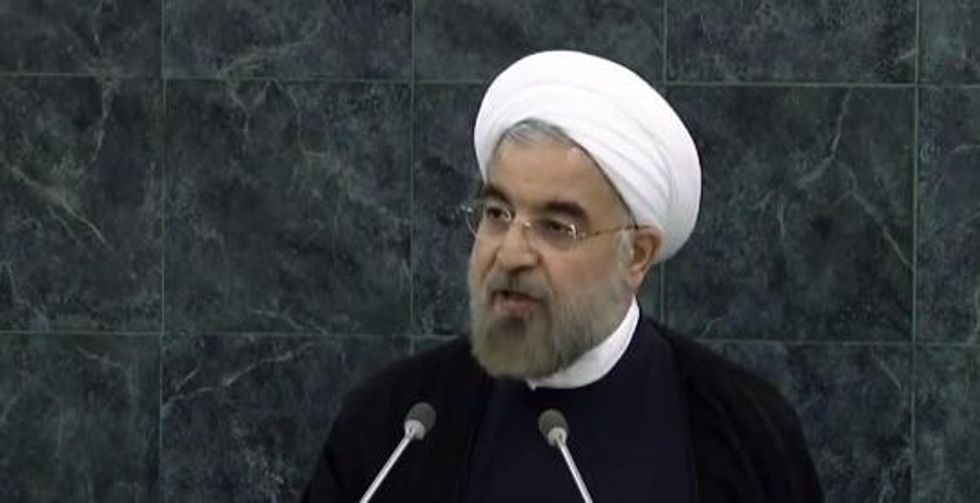While the world responded positively to the deal reached between Iran and the five permanent members of the UN Security Council and Germany (P5+1,) Israel's Prime Minister Benjamin Netanyahu persists in calling the deal a "historical mistake". In addition, he is doing all he can do to block that agreement, aided in that obsession by most Republican and several Democratic Senators.
There are several reasons why a deal with Iran on its nuclear program is convenient for the U.S.: it would remove an important cause for conflict in the Middle East; it could lead to valuable trade agreements between Iran and the U.S.; it could help remove the atmosphere of hostility against the U.S. throughout the Middle East and it could help foster other peace agreements in the region.
By contrast, war with Iran caries enormous risks and threatens not only regional but world peace. That those advocating war with Iran choose not to see them doesn't make those risks less real. Many in Washington believe that Netanyahu, so far unable to stop the recent agreement, is determined to do anything in his power to spoil it and make it fail.
They ignore that the recent agreement has placed significant obstacles to Iran's nuclear program both through the uranium enrichment option and through the production of plutonium that could be used to produce a nuclear weapon.
Netanyahu has insisted on placing greater demands on Iran such as serious constraints on its missile technology development. Writing for Reuters, Dan Williams quotes Isaac Ben-Israel, an aerospace expert and former strategic weapons designer with Israel's Ministry of Defense when he said that such demand was setting "too high a bar" on Iran's ballistic missiles. Ben-Israel indicated that a condition to curb their missile technology would be interpreted by the Iranians as undermining their national scientific interest.
In the meantime, some members of Congress, led by Senator Bob Menendez, the chairman of the Foreign Relations Committee and GOP Senator Mark Kirk, have been trying to derail negotiations with Iran by adding several of Iranian trading partners to the list of organizations already subject to sanctions, which led to a temporary suspension of the Geneva talks on the part of the Iranians, who interpreted this move as going against the spirit and the letter of the Geneva agreement.
When that proposal stalled, Menendez and Kirk drew a new bill, the Nuclear Weapon Free Iran Act of 2013 which, among other provisions, calls for Washington to provide military and other support to Israel if its government "... is compelled to take military action in legitimate self-defense against Iran's nuclear weapon program."
Not all legislators agree with Menendez and Kirk's point of view. Writing in Politico magazine, Democratic Senators Carl Levin and Barbara Boxer stated, "If Iran doesn't follow through on this opening [the Geneva accord] or if in the end the regime is not willing to rejoin the community of nations, then we should impose more crippling sanctions, and make clear that all potential options, including the use of military force, remain available. But we shouldn't pass legislation now that would endanger negotiations that most people and countries want to succeed. Such congressional action now could bolster the efforts of Iran's militants to kill the deal."
The administration has informed those sponsoring the bill that its passage is not necessary because if negotiations don't succeed or Iran cheats it should be very easy to enforce even more stringent sanctions. As Meir Javedanfar, an Iranian-born Israeli Middle East commentator has stated, "And when it comes to the current contract, the chances of Iran not living up to its commitments are low, because if it is discovered that it has cheated, additional economic sanctions could be imposed, and this could pose an unprecedented threat to the regime. The reason is simple: The regime can live without its nuclear program, but it can't live without its economy."
It is difficult to understand Senators Kirk and Menendez insistence in making proposals that jeopardize the US' own interests. The time is ripe for necessary peace, not unnecessary war
 While the world responded positively to the deal reached between Iran and the five permanent members of the UN Security Council and Germany (P5+1,) Israel's Prime Minister Benjamin Netanyahu persists in calling the deal a "historical mistake".
While the world responded positively to the deal reached between Iran and the five permanent members of the UN Security Council and Germany (P5+1,) Israel's Prime Minister Benjamin Netanyahu persists in calling the deal a "historical mistake".